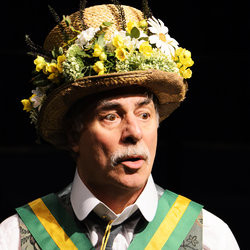Barrie Rutter on An August Bank Holiday Lark: 'I didn't want it to be a case of everyone goes to the trenches and dies'
The artistic director of Northern Broadsides speaks to WhatsOnStage about the company’s new production commemorating World War One
Currently playing at Newcastle-under-Lyme’s New Vic Theatre, Northern Broadsides’ premiere production of Deborah McAndrew‘s An August Bank Holiday Lark moves into the company’s base at Dean Clough, Halifax, on March 11th for the start of a six-week run in Yorkshire theatres as part of a tour lasting until Mid-June.

©Nobby Clark
An August Bank Holiday Lark takes its title from Philip Larkin’s poem MCMXIV ("Never such innocence again") and begins in Wakes Week 1914 in a Lancashire village, complete with Rushbearing Festival, singing and clog-dancing. The second act moves on a year and shows the ravages of war. Director Barrie Rutter, on a flying visit to Dean Clough, took time to explain the origins of the play before heading back to the New Vic stage:
"We were in a board meeting and our chairman said we should do something to commemorate the war’s centenary in 2014 and I immediately said, ‘An August Bank Holiday lark’ and somebody said that would be a good title for a play. So I got in touch with Debbie and said, ‘Do you want to write it? This is the title because it’s a good ‘un. I don’t want it to be it’s grim up north and everyone goes to the trenches and dies. I want there to be lots of folk dancing and other stuff in it.’"
Debbie instantly agreed, did her research and came up with the idea of the rushcart, a metaphor for the returning soldiers who can no longer dance (rather like the football match in Sean O’Casey’s The Silver Tassie). The rushcart festival, still current in some villages in Lancashire and Cumbria, began with villagers bringing new rushes for the church floor every year and grew to involve a cart elaborately decorated with rushes, plus much singing, dancing and general merry-making.
See Also: How are theatres across the country commemorating the Great War?
When I asked Barrie what was different in An August Bank Holiday Lark compared with, say, The Accrington Pals, his first answer was that Northern Broadsides’ play doesn’t go to war, it stays in the village and looks at the loss of innocence expressed in Larkin’s poem:
"It’s the innocence of Wakes Week 1914, all joining up and somebody’s mam’s so proud of him for it, white feathers come into it and the women taking over in the mill. All the emblems of 1914-1915 are there, but I didn’t want to get there too soon. I didn’t want to show reality either – television does that very well and there are plays that do that very well – Birdsong is on its second tour this year. We use metaphor: preparation, celebration and, finally, a clog dance of memory, of commemoration."
However, to me the biggest difference seems to me the amount of care taken to place the play within an authentic English tradition. When the First World War changed the world, it didn’t only drive the rich from their country houses and get the women the vote; it also broke traditions of agricultural life which, in many cases, had survived into the industrial age. An August Bank Holiday Lark draws on those traditions. Remarkably rehearsals have been divided equally between work on the text and Conrad Nelson‘s work on the music and dancing:
"My friend, the late great Mike Waterson, was one of the doyens of English folk. I met him when he was dying and I said, ‘Do you want to write me a song for 2014?’. He said, ‘I won’t see 2014 – I’m dying.’ I said, ‘I know you are, but I’d like you to write a Rushcart Song.’ So he wrote it and recorded it with Eliza Carthy, Norma Waterson and Martin Carthy in their studio in Robin Hood’s Bay. Conrad’s taken that song and incorporated it into the play.
"Conrad’s been dancing with Saddleworth Morris Men who do a Rushcart, a week before Sowerby Bridge do theirs, and they’ve given us permission to use it in the play. We have some of their traditional music and we have a Rushcart Song from 1914 which Saddleworth Morris found – with the words, ‘We’ll show the gun/To fight the Hun.’"
This approach had an interesting side-effect on the casting. The eight men in the cast had to be able to reach a high enough standard of dancing in four weeks rehearsals. Possibly for this reason, six of them are new to Broadsides, only Andrew Whitehead joining Barrie in the cast as Broadsides veterans. The four female parts have been cast with talented actor/musicians.
So the clogs return to Northern Broadsides! Barrie Rutter is a passionate defender of the humble clog. Just as a simple thing like a laurel wreath became the most sought after honour in Ancient Greece, the clog is "a common thing metamorphosed into something wonderful" – transformed from a working thing to an object of celebration. In their time, as in The Wars of the Roses, clogs have fought battles for Broadsides. Now they are an essential part of the story of the nation’s lost innocence.
An August Bank Holiday Lark tours to the following Yorkshire theatres:
11-15 March – Viaduct Theatre, Halifax
18-22 March – Lawrence Batley Theatre, Huddersfield
1-5 April – York Theatre Royal
8-19 April – West Yorkshire Playhouse, Leeds
22-26 April – Stephen Joseph Theatre, Scarborough












